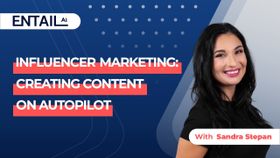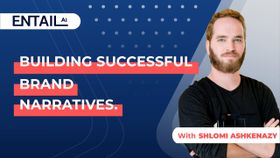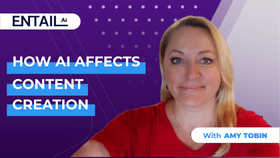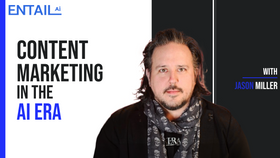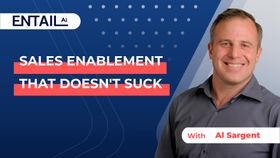Branding's immeasurable impact: Ari Yablok's take on standing out, not standing still
Branding is a strategic investment, not a luxury. Discover the true value of a strong brand and why the best time to focus on branding is yesterday.
Updated February 28, 2024
AI Summary
Every business needs a branding strategy to stand out—no matter the market. Still, many businesses don't make it a priority.
Adam and I sat down with Ari Yablok, head of brand at Island, who shares why branding is a necessity and how to build a brand that lasts. In this insightful discussion, we tackle a few key questions:
- What solid business case can you make to invest in branding, particularly for startups focused on performance?
- How can you accurately measure the long-term impact of branding?
- Does branding make strategic sense for every company?
Drawing from extensive leadership roles elevating top brands, Ari provides eye-opening viewpoints that got me to re-evaluate how I perceived branding—a vital competitive advantage, not just as a creative function. He also shares how strategic branding drives faster sales cycles, increased organic traffic, and prospects seeking you out.
This discussion is one of my favorites. It'll widen your perspective and spark new ideas on how you can develop your brand. Let’s dive in.
Hi, welcome, everybody. We're happy to have on the Entail podcast today Ari Yablok from Island. Before we start, Ari, it'd be great if you could take a second to introduce yourself, please.
Sure. First of all, thanks, Tom and Adam, for having me on the podcast. My name is Ari Yablok. I've been the head of brand and corporate marketing at Island for two and a half years, coming up on three.
Before that, I was head of brand messaging at a B2B branding agency in Tel Aviv called Atreo, and worked on some pretty fun projects spanning across the tech industry, from cybersecurity to MarTech, to quantum computing, to EA esports, among others. I really got a sense of what it meant to build a brand, finding that unique aspect that made a brand special.
My role involved end-to-end branding, including storytelling, company naming, investor deck writing, explainer video scripts, and web copy, among other tasks. This experience led me to a company called Island, which I named and joined as their head of brand. It's been a special journey ever since.
Why most companies don't prioritize brand
Before we start, I got to tell you, at Entail, we deal more with organic marketing and content.
Most of the content we do is not really about brand; it's more about reaching your target audience, answering their questions, or helping them find solutions to their pains, problems, and challenges. When you look at organic marketing, it's very interesting to see that for most companies, especially larger ones, the highest percentage of organic traffic is branded traffic, people searching for their brand. And this is the traffic that converts the best. I just saw research by Neil Patel’s company showing that most of the searches on the internet that yield sales are branded searches.
So, in other words, the data is there that nothing is stronger than brand. But then, even though companies know that what drives most of the sales or what converts better than anything else is branded traffic, it's very difficult to get companies to invest in branding because it's kind of the opposite of performance marketing. If you do PPC on Google, or if you run ads on Meta, you know how to measure your return on ad spend, how much you're spending, how much you're making, but with branding, it's so different. And before we dive in, this is a big topic for me. I'd like to hear your take about this.
Yeah, there are a couple of podcast episodes in what you just brought up, but I definitely have some thoughts on that. I see brand as not a separate effort from organic marketing and communications.
I would even say that's at the heart of what your business plan is, what your product strategy is. We are building something that is meant to deliver a certain message and fill a certain need. And our story should be communicating what our product is doing in the market.
I would say that anytime you're trying to communicate to your audience and target their pain, speak to it, and send the message about what makes you different or what positions you as uniquely special in a way that you could solve that problem, that is your brand. The way it looks, the way the digital ad is set up, all that is how you dress it up. But the brand is really that core message.
What I think makes it hard for companies, especially earlier-stage startups, venture-backed startups especially, to invest in brand, comes down to three things, and you touched on a couple of them. One is, it is by its nature a creative endeavor. It is not something where you input numbers and output results, where you have a game plan that you could just take something that was done and do it again. The whole nature of branding is differentiating yourself.
It's very different than what other marketers and go-to-market teams are doing, which is very much about following the plan, building the plan, and following it.
Like you said, secondly, it's hard to measure. You don't really have a clear destination. You are almost always taking a risk that has yet to be proven in the market, which is also very different than what you're doing in other go-to-market efforts where risk is usually lower, and the outcome is usually a yes or no thing. Did we hit our target? Did we miss our target? Here, you put out an ad, and you don't necessarily know if you hit it or missed it in the traditional sense.
The third part is that it's a long-term investment. It is not something where you can run and check back in two weeks and say, did we do it or not? It is something that, in many aspects, takes a year or more to understand if what you've been trying to do for a year is starting to take hold, and venture-backed startups usually don't have a year to invest in something.
They usually have to report on their activities quarter to quarter, which is just not the same timeline as branding requires. I think this discrepancy causes founders and marketing leaders to postpone brand investment, saying, "we'll get to brand when we hit our mark, when our leads start to come in, when the pipeline is big enough." And then, by the time they reach that mark, they realize they should have been investing in brand this whole time. They recognize they would have had much more coming in had they done it from the start.
I agree with that, and I see it happening a lot. It's similar to SEO as well. It takes time. Usually, the way we build it, we can start seeing results in just several months, like usually two or three months, we can already measure the indicators. But when we started working on our own brand, doing a podcast now, we started to work on our brand as well. And I also saw, like Neil Patel says, you need to invest in video because that's his channel, right? Videos and content across all channels. And he's saying you need to invest in it a year or two before you can even see results.
When to start investing in brand
So, going back to what you said about startups and venture-backed businesses that only start investing in brand once they see some traction on other channels, but when do you think is the right time to do that? I mean, because sometimes when you're just starting out in your startup and you don't have any performance channel working for you, you may not have product-market fit yet. So, is it maybe too early to start?
I have a bit of an unconventional answer to that, based on my own story. I joined the company that was in stealth mode as their first marketing hire, as the brand guy—this is Island. We were nine months away from launching our product. For the startups that feel they should be investing in brand once they get to a certain milestone. I was two years ahead of that because it was almost a year before we even launched the product. We had a very good feeling about product-market fit.
I had entered at a time where our co-founders, who were industry veterans, had already vetted this idea over a hundred times with our target buyer. That's maybe a unique situation to have product-market fit so early on, but I actually don't think that matters.
What you need to be doing is honing in on the problem you're solving and the way you're solving it, which is really product-market fit, right? How this technology is going to be implemented or operationalized? I think that might go through a few phases, and that's okay. Assuming you're not changing industries, assuming your target buyer isn't shifting to a completely different part of the organization, you can still be telling a very meaningful and compelling story about the problem that caused you to start this company to begin with.
That is likely not going to change even as you pivot. And when you do that, you're getting people's attention.
It's so valuable to have all of those things running so that when you do find the product-market fit, you don't have to now start from scratch and say, "Okay, how do I talk about this?" So, I think the answer really is yesterday.
You mentioned that brand can be seen as taking this bet, and you won't really know if it's going to pay off for a while. Maybe ironically, early-stage startups or venture-backed companies, that's kind of the raison d'être of their entity as well, right? Regardless of if you think you have product-market fit, there are so many factors that contribute to whether a company is going to succeed or not, regardless of product-market fit.
So it's kind of a bet anyway. It's interesting that, on the one hand, your partner might be someone who's taking a massive bet on the entire exigence of the whole organization, but in this one area, they're like, "I wouldn't take a bet there." So, how do you find that kind of paradox, and are there companies at different stages that suddenly become more reflexive to the idea of brand, or have you found in your experience that it's always the same story, regardless of where the company is in the life cycle?
Both great points, and I'll deal with each of them separately. Your first point is, this whole thing is a big bet. The idea of starting a company is a big bet. All of what you're doing is an unknown until it becomes known. But I think the nature of business, where you have input and output, and you can easily measure and easily understand if you're hitting targets or not, and dial certain things up and down, is comfortable.
I think that's an important word to think about here, even in traditional marketing, where I'm creating some sort of message or CTA, which is getting someone to do something. I can see if they did it or not. I'm very comfortable in that world, where I know point A and point B, and I can measure it. And even if I'm failing, I can understand why and what to do about it.
I think, even though the whole thing is a big bet and every quarter you're betting on yourself—and every time a salesperson picks up a call, they're betting on themselves trying to win—it's a comfortable bet that they've made many times and they know. They're comfortable making and spending serious money on an idea, on a story where what happens next isn't even clear.
Obviously, you could measure things like website traffic or social engagement, which is important to measure. But interestingly, the things that I love measuring are when a sales guy texts me saying his buddy from his previous job just texted him saying, "That post was brilliant." That's brand at work, and that's one person that's never going to show up anywhere, but that's going to do something.
If there are ten more people who felt the same way, even if they didn't talk to us about it, or a hundred more, and if we keep doing it well, it will be a thousand more, and then 10,000 more. Then we're doing something right, and you won't be able to measure it. So it's uncomfortable. But the payoff is exponential growth, inbound instead of outbound, and warm leads instead of cold leads.
All of those intangibles that you were trying to achieve by building bricks and by kind of one-to-one work is now coming in five-to-one, in ten-to-one. So that's the answer to that first question.
Is there a moment in the life cycle where people suddenly feel that need? You know, if they say, "Okay, hey, this is the time when we feel that," and maybe why they might feel that pain. Have you ever experienced something where you realize, okay, companies reach a point, and then suddenly they feel the lack of having invested in brand?
Any company that is in a somewhat saturated market, in a red ocean, is going to feel that need immediately because they are going to enter a world where they feel like they're on mute and everyone else is talking, and they know that they can't just say the same thing that the rest of their market is saying.
I think they feel that because they know if they just enter the market and say, "We solve this problem, just like them," we're going nowhere; this is not going to work. So, I think it's in new markets, especially, but I'd also say if you're building a new category, which is what at Island, we are doing. We introduced this idea of an enterprise browser. The day before we said those two words, no one was using it.
It was a legacy term that was misused by products no one was even interested in anymore. And suddenly we started using it, and now you could look at Microsoft Edge for business, and they're a secure enterprise browser, and you could look at seven others.
So, that's something that was brand messaging, story-driven communication where we wanted to put that message out there. That was not a paid move; that is organic storytelling to an audience to get a message home. It took months, not years, but it was an absolutely necessary thing that our founders understood from day one. We need to be working on getting this message out. So, yesterday.
» More from the podcast: Sandra Stepan discusses influencer marketing and creating content on autopilot
Standing out in saturated markets
I went to a typography lecture here in the UK, and one of the points of the history that they were showing is the increasing homogeneity of brands over time in terms of colors and type. The market trended from very unique type fonts to more consistent, meeting users' expectations. And now it's reached this problem where a lot of consumers, whether they're individual consumers or corporate consumers, can't really tell the difference anymore.
And brands become so unindividualized that they don't really stand out. And so many companies are talking about moats, and it seems like almost every vertical is becoming a red ocean in terms of the number of players. So, would you say that brand is a very defensible moat? And can you talk a little bit about if brands get copied on their brand messaging, or if it's a layer of your business that actually gives you something that isn't really easy to copy and duplicate, like code, and then persists over time?
You said it pretty well. Every market is becoming oversaturated. There are very few brand-new ideas showing up, and when they do, within months, they're not new anymore because there's a whole market around them. So, the idea of "let me just tell people what I'm doing and if they like it, then they'll give me their money" doesn't work anymore. It's the same way as a good analogy: "let me write a blog and people will read it." Right now, there's Gen AI. There's ChatGPT. A four-year-old could write a blog as long as they know how to talk into a computer, and it's very hard to differentiate between the four-year-old's blog and yours.
And for some reason—I think it's the creative gap; the idea of doing it but not doing it in a way that is completely unique is what's grabbing most people's attention.
There are a ton of marketing teams that are doing a ton of marketing that are just drops in the ocean, not getting anywhere because they're taking the philosophy of "as long as I'm doing it, people are going to listen." And a great place where I see that all the time is trade shows. I go to multiple security and IT trade shows a year, hundreds of booths, exhibitions, hundreds of technologies, many of them in the same category, many of them one after the other, saying the same thing and none of them even finding a problem with it.
There are times where I would go up to a booth and ask, "What do you guys do?" And they say, "Oh, we do the same thing as them." That's the answer. And I'm shocked that they would feel comfortable saying that because if that's the case, then you're not making any sort of case why someone should go with you over them. I do think this is a table-stakes situation now.
If you're not treating brand seriously, not as a creative art—and that's the point—but as a strategic business decision for how we will get the attention we need. How are we going to do justice to the great technology that we built that no one's going to care about unless we put the right story out there that gets people to notice?
As a business move, you're starting from behind in 2024.
Who should invest in brand?
I really agree with that. We're seeing it's exactly what you're saying. The market is obsessed with all those AI tools. And if you Google, for example, AI marketing, AI content generation, whatever, you see all those cheap ways of creating content now. And what he said is right on the money. Because if a four-year-old, as you put it, can create the same blog that you can with ChatGPT, then this blog has no value. It means that you can ask ChatGPT to do it.
I also saw another thing recently. I've been watching Neil Patel. I started liking him. He showed that—I don't remember the exact numbers—but the number of views that blogs get, those that are written by humans compared to those written by AI, is at least like five times to the human side. So, like you said, you need to create something interesting and compelling. And as a business, I often say, that's your only currency. Because you're not in entertainment, it's much more difficult. You need to be interesting. So, it's not as if you're using the same tools that anyone else can use, and you're creating the same content that anyone else can create.
First of all, Google will probably not index it. And second of all, it's not going to be interesting. It's going to be superficial and shallow. You need to create much better content. But another aspect that I've been thinking about, and that's been like a riddle for me that I haven't been able to solve yet, is who should invest in branding? And I just want to refine my question a bit. So, I'll give you an example from our experience.
We worked with a gaming company where the lifetime value of their user is about 2. They work on volume, like millions and millions of users. But also, what they're selling doesn't have a specific intent. So their users don't come because they want to buy the best shoes or the best website builder or whatever. It's more general. So their conversion rate is like half a percent more or less. When you multiply a very low LTV and a very low conversion rate, you end up with a very low ETV, which is earnings per visitor, which means that if you want to create content, the cost of content is going to be much higher than what you are earning per visitor.
It's very difficult for a brand like that to create content for itself. So they need to go elsewhere and advertise on gaming channels, etc., where there's lots of users, and they pay the channel owner. That's how they advertise. For them, content creation is not the right channel; the numbers don't add up. You need a certain LTV and a certain conversion rate to be able to create content.
What I'm trying to ask is, do you have a kind of formula? Can you define the characteristics of companies that need to invest in brand? And, for example, if you are a drop shipping company and there's less and less of those, maybe because of all of what you mentioned before. But if you're a drop shipping company, then probably brand isn't the right move for you because you're just selling random products more or less. So, can you define which brands should invest and which companies should invest in branding?
I think the challenges you're bringing up are not necessarily a question of who should or shouldn't invest in branding, but more about what our tactics should be based on our business model.
For the gaming company mentioned, I would look over the business model to see its viability and what kind of marketing budget is even available to make that work. But if we have to do branding on a very low budget or instead of media buying and billboard out of home and serious media production, maybe we need to go more low-key; maybe we need to get into culture hacking, right? Getting into communities that our customers are in.
A great example that I love showing people is a great clip on YouTube of Wendy's. One of their marketing geniuses went into Fortnite and used the player with the girl with red hair and jumped into everyone's games and started destroying freezers. She wasn't playing against other people or shooting; she was just chopping down freezers everywhere she went inside kitchens. And it was to send the clever message of "Our meat is fresh and is not frozen, unlike the other fast foods," and it was such a random thing.
If you think about what that person had to do to sell that to the CEO. First of all, it didn't cost much. So that was at least a good foot in the door. But what was that going to do for the company? It's not going to sell more hamburgers, I don't know. But it got on the local news, it got millions of hits on YouTube, and I'm talking about it years later, right now on a podcast. Can you quantify the value? Is there a company that would rather not do something like that, instead of doing it? I think everyone would opt to do something like that to differentiate themselves. That's really the answer to the question.
The biggest thing that I keep saying, and I hinted at it before, is at some point, the stuff you're doing early on, which is usually more one-to-one effort, where I'm trying to go after customers that I know, go after low-hanging fruit, go after low-effort, low-touch opportunities because they're the easiest ones to get. At some point, those dry up, and then I have to go after people who don't know about me, don't care about me, and I need to 5x it. I not only have to start cold, but I have to be 5 times more effective at what I'm doing.
The same tactics usually just mean spending 5 times the money, and sometimes 10 times the money. And again, that's just wildly ineffective, but it's also not sustainable. You're not going to hit your targets just by throwing more money to get less money. That's where brand really comes in as a business strategy. I need to see how I can do something within the communities and the target audience that I know I need to be speaking to that will get them to come to me. Now they'll notice me, so that when there's an event with 4,000 booths, they want to find my booth and not that they stumble across it and have to decide if they care or not.
Learning from Island's example
We can focus in on Island then. So when you go to Island's website, you have that kind of nice aha moment of, "Oh yeah, this is so obvious. How come no one thought of that before?" And that seems, or I wonder if you would say that's like a brand home run if you have the ability to tell that angle of "Hey, we're doing something that is so obvious."
So with your journey with Island so far, would you say that was an easy win that you were able to tell that story, or do you think that every brand maybe has that kind of angle, or tactics-wise, how did you arrive at that tactic for Island?
With Island, the big home run was that the product was amazing. I think that's the biggest home run for brands. If you don't have to sell someone on an idea that isn't really there, once you reveal what's behind the curtain, but the thing behind the curtain is actually better than you could have ever described it, then that's the home run. Blessed to say, we had the perfect product for our market. And the real challenge was, can we tell a story that does justice to what's behind that? And that's a great place to be in. And that's really why, when I heard about this, I said to myself, "This is a must-do brand." Like I have to get involved.
The way we went about it wasn't easy. It wasn't a slam dunk. Our target audience is C-level. These are people that are getting pitched all day, pitches of things they've seen before, just slightly faster or slightly better, and the way to test them out is to have a whole team show up to your company and rip out your network security and plug this one in and test it for a week. And the payoff, you can't even quantify so easily.
These are people that are jaded, that don't want to hear about it. Not only that. We're selling them a browser that they have for free. So, we had to convince them that something they're paying zero dollars for is something that they should suddenly have a major investment for, build a new budget line for.
There were a lot of challenges to how to break through, and I think that's what made the need to sound different and feel different as a company so much more strategic and not just a "Nice, cool thing that we have a brand dude that could make funky ads or tell cool stories."
No, this was meant to send a very clear signal to our buyer: What you're about to see is something you have not come across yet. And you should take notice because it's new. That was the way we spoke about it. We made deliberate decisions around our terminology and our vocabulary.
We initially were targeting CISOs, cybersecurity leaders of major enterprises, Fortune 50 enterprises. These are people who have heard the terms "risk" and "threat landscape," and they've seen hoodies, bugs, locks, black and red, and scary language their whole careers, and it just all blended into one scary-looking brand.
Our whole story was that if you put work in the place where it belongs, where it is fundamentally safe because it's in the right place, you don't need to lock it, you don't need to be scared of the threats beyond it, they are not applicable, they're not relevant.
We put our buyers in a natural, peaceful, zen-like state when they showed up to our brand, as opposed to every other company whose value prop is, "you are at risk, so you need us to help you." We went the opposite way, which is "when you're on Island, you're fundamentally safe, so enjoy your day. Enjoy your life." And that signal, which sounds cosmetic—sounds "ooh, let's do green and sand and nature and get away from words like risk and threat and attack, and instead do 'work as it should be.'"
And they see every brand everywhere. We're not spending more money to put our brand in front of you. But when you see us, you remember us. And that's the difference.
How to measure your branding efforts
My approach has always been quite different than that, almost cynical, focused on performance. But I see more and more the need for branding and also a lot of the activities that we do now at Entail, they're related to building brand.
I'm also interested in, even though you say it's more difficult to measure and it takes a long time, what are the indicators that you look at? I mean, you gave one example of this one guy who saw your ad and mentioned it, but are there other indicators?
We often look at organic traffic, so I can definitely say if you see an increase in organic traffic, it has to do with brand. We often see the companies that we work with, if they run ads, or if they do influencer marketing, you can see those peaks; if it's an e-commerce company around Black Friday, Cyber Monday, you see those peaks in branded searches, and you know that's as a result of their other marketing activities.
What indicators do you usually measure, I mean, when you talk about or when you need to justify the budget to the CEO, to the others?
First of all, I think a CEO to do brand right needs to understand its value inherently. And it's very challenging to kind of prove the value of brand the same way you're proving the value of lead gen marketing or sales enablement and things like that; it just doesn't work the same way. If they're expecting you to produce the same type of projections, then it's just a challenge.
I know in some ways it's unavoidable because you can't just keep asking over and over, "just take a bet." But I have co-founders who say every quarter, we're going to bet on something, and we're going to learn from it. I don't mean to say that we have to have the results in by every quarter, but the idea is we treat what we do as a very well-calculated experiment that helps us understand what we need to do next. Do we need to do more of that, or do we need to go in a different direction?
Obviously, if you miss a lot of times, either you have the wrong personnel, the wrong strategy, or the wrong planning. You just can't always be wrong. The idea is you have to take a calculated risk.
In terms of measuring, I think there are a few key points that would eventually need to be the sole thing you're looking at for brands. The most common and the easiest, because it's very measurable, is website traffic, organic web traffic. People searching for not just your product and then finding you, which, if they find you, means you're doing SEO correctly, but searching for your company.
If they're searching for your company name, that means they know about you, and they're looking for you. Usually, you could find out how they're getting to you, either by asking them if they reach out with the contact form, "How did you find out about us?" or "How did you arrive here?" or some other measurement tools that you could find. I think that's the foundation of measuring brand. Are more people showing up to our website because they're looking for us?
When you're at trade shows, are more people showing up to your booth because they said, "I heard of you, I saw you on the list, and I had to go see what you guys are up to." Now, at any given trade show, that might be a couple hundred people if you're lucky. So, is that a meaningful number in a vacuum?
Maybe not, but I think that's a very meaningful number over time. Where we're saying the effort we did a few months ago made the investment in this trade show that much more impactful. So a lot of it is interconnected investments. I think there are sales cycles that you want to measure, which is hard because you don't have a lot to measure against it.
If a sales cycle went really fast, you can't really say how much slower it would have been without brand. But we have several customers that reached out to us directly through our website, ready for a proof of concept, and closed the deal within a month. We're a high-ticket enterprise software. These things usually take six months if you're good.
They trusted what we were going to say; they were convinced that what we had was the right thing. They just needed to be sure of it; they needed to see it for themselves.
That's a very business-driven metric that you could say. If I could follow someone showing up and how fast it takes them to sell versus someone our sales rep reached out to and asked, "Would you be willing to jump on a call?" and then had to prove it to his team and that team's team and then the next team.
We have this exact thing right now with two very large companies—unicorns, basically. One of them, we reached through an intro, and it took months to close them. The other one reached us just like you said. They were interested, they heard about us, and they came very warm to the conversation.
We had a discovery meeting, and after that meeting, they initiated the follow-up in two days. And this is an enterprise company where, usually, as you say, it takes months. And with them, it was two meetings a week just to close it, to negotiate all the terms. They came in very warm, not even a warm lead; they just wanted to close. I never thought of it in terms of brand, but it makes total sense what you're saying.
Repeatable and scalable branding activities
We're in marketing automation, and what we often do is look for what types of marketing work, and then we build them manually and then find ways to automate them and scale them.
We're always looking for those activities that are repeatable and scalable. You gave the example of Wendy's on Fortnite, and that's a one-off, you know, it's a crazy idea. You don't hear many of these every year. It's very rare.
Are there any activities that aren't just mundane, regular stuff, because eventually, according to your branding strategy, you want to stand out, right? You want to do things that are special. My question is, are there activities that are repeatable and scalable when it comes to branding?
There certainly are on the execution side, on the distribution side, on the promotion side, where there exist automation tools, and you can take assets and turn them into a bunch of micro-content, turn a long-form podcast like this into soundbites that can be used that are actually way more popular than long form.
I don't know if that's interesting or that's what you had in mind, but I do think the conundrum is the real work is the guy who thought of entering the Fortnite game and start hitting freezers. That's not repeatable, and that's not something ChatGPT is going to help you with because, by definition, no one thought of it yet.
That's where the idea of having someone in-house, which is again a unique thing and that's maybe starting to become more common in small waves. Someone in-house who is your storyteller. Someone who is going to understand not just how to tell a good story but is going to be in the culture of the company and very versed in what your product does, how customers feel about it, and what they'd say about it. So that you're not outsourcing perhaps the most strategic thing of your marketing efforts, which is the message that we're going to send that's going to get people to love what we do.
Now, if you're only the creative, I think you're in big trouble. I think you need to create a system where it feels easy inside a company to turn a creative idea into an actual campaign into something we can distribute quickly. That's something that I'm having meetings about daily now. How do we turn big ideas, and even medium or small-sized ideas, into campaigns that can run next month or by the end of this month and not two quarters down the line? Then you just become this big visionary guy that isn't really impacting the business much.
It feels too disconnected. And that's where automation can really help. If I have an idea and I can turn it into a 30-second video and I can turn it into eight graphics. I can plug it into this social media platform, and I can plug it into HubSpot to get the links I need to track it. I can create a calendar of posts that are going to help me craft the messaging around this entire story, and I can say how it all fits. I can have the metrics that I want to measure behind it. That's so much more powerful than just having a really good idea and not knowing what to do with it.
Although everyone speaks about ChatGPT and AI and how they churn in marketing and all that, it seems to me, and I see many examples of evidence for this, including what you're saying now, that although we have all these advancements, we have to go back to the basics, and that's creatives because we have to stand out.
If there are so many tools to automate processes and everything looks the same, just like Adam says, all the brands start to look and feel the same, you need to stand out, and you have to go back to the creativity that people bring, and that's something AI can't do for you yet. Maybe you can use AI as another arm, but the brain eventually is the human brain, and you need to bring that creativity out. And that's super interesting.
I feel almost disappointed that we have to finish now because we're out of time. It's been very interesting, and it feels like we're stopping in the middle. So I definitely want to have a follow-up for this. But just like you said, we rely on the creativity that only people can bring. And that's why we do this type of content where we can find experts and get their perspectives. And that's what's so interesting and completely different than anything else you can just generate automatically.
Thank you very much, Ari. It's been a pleasure. It's been very interesting.



